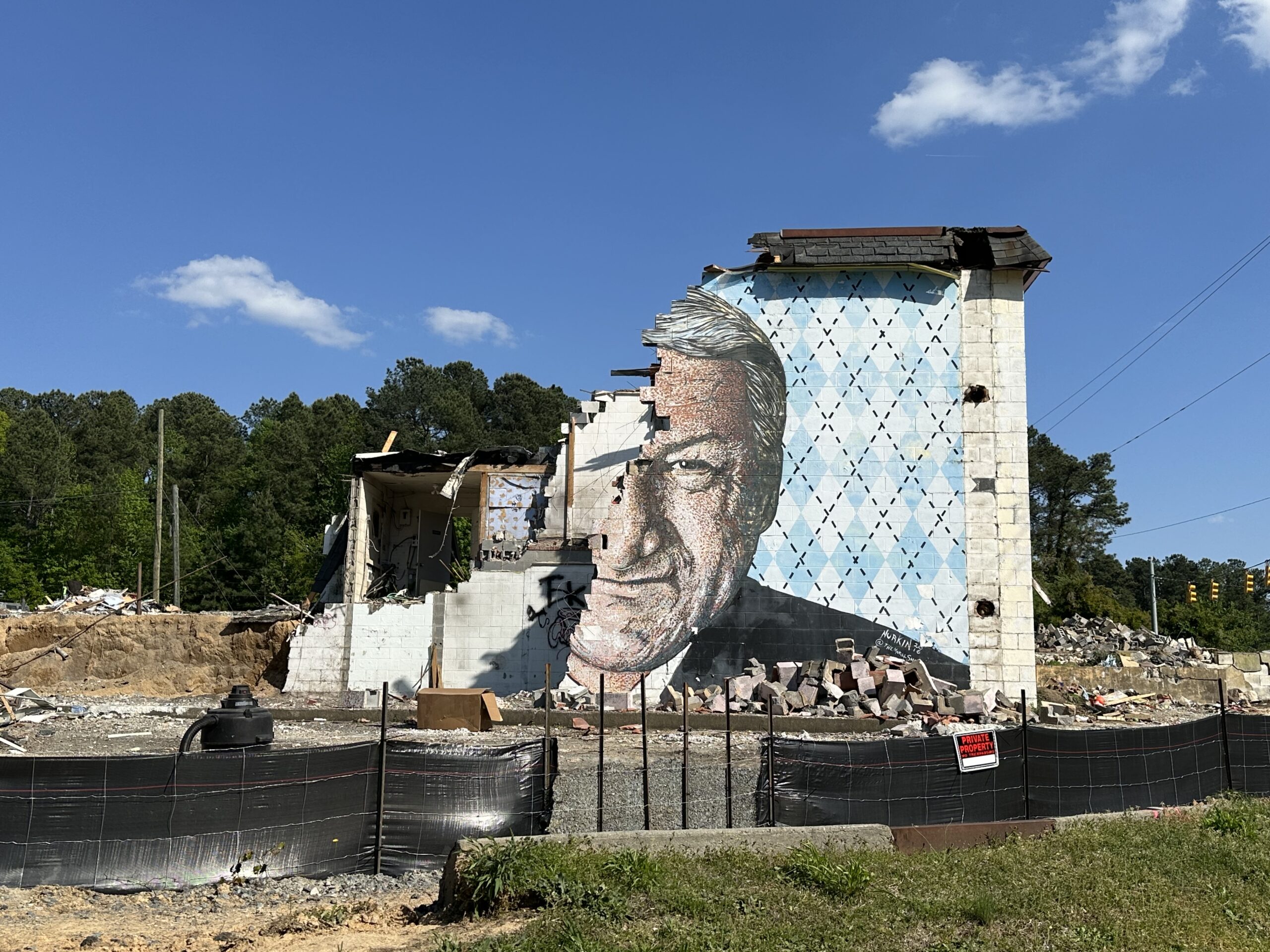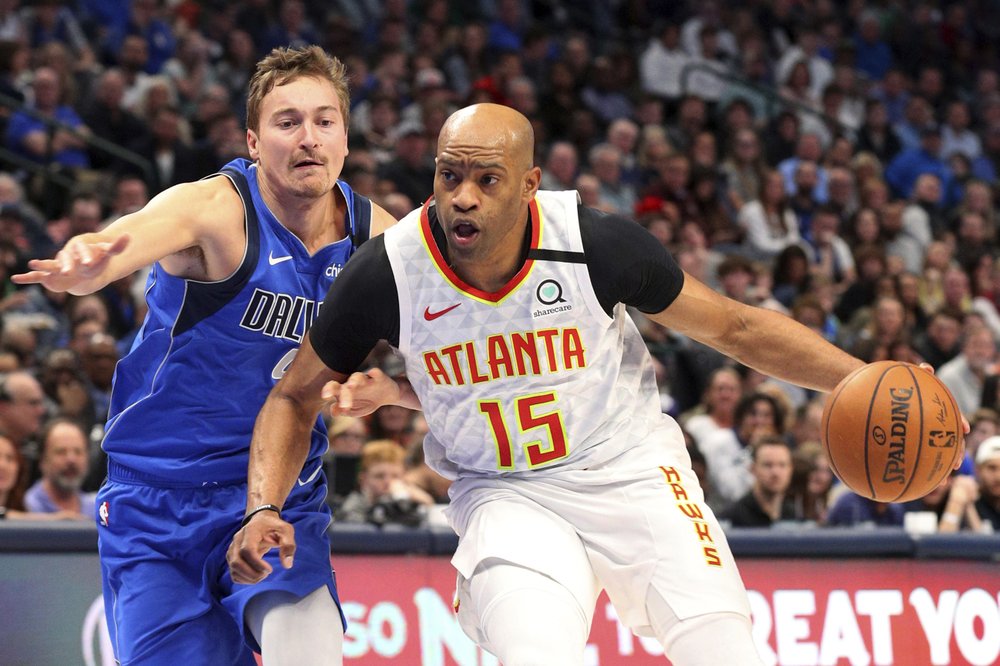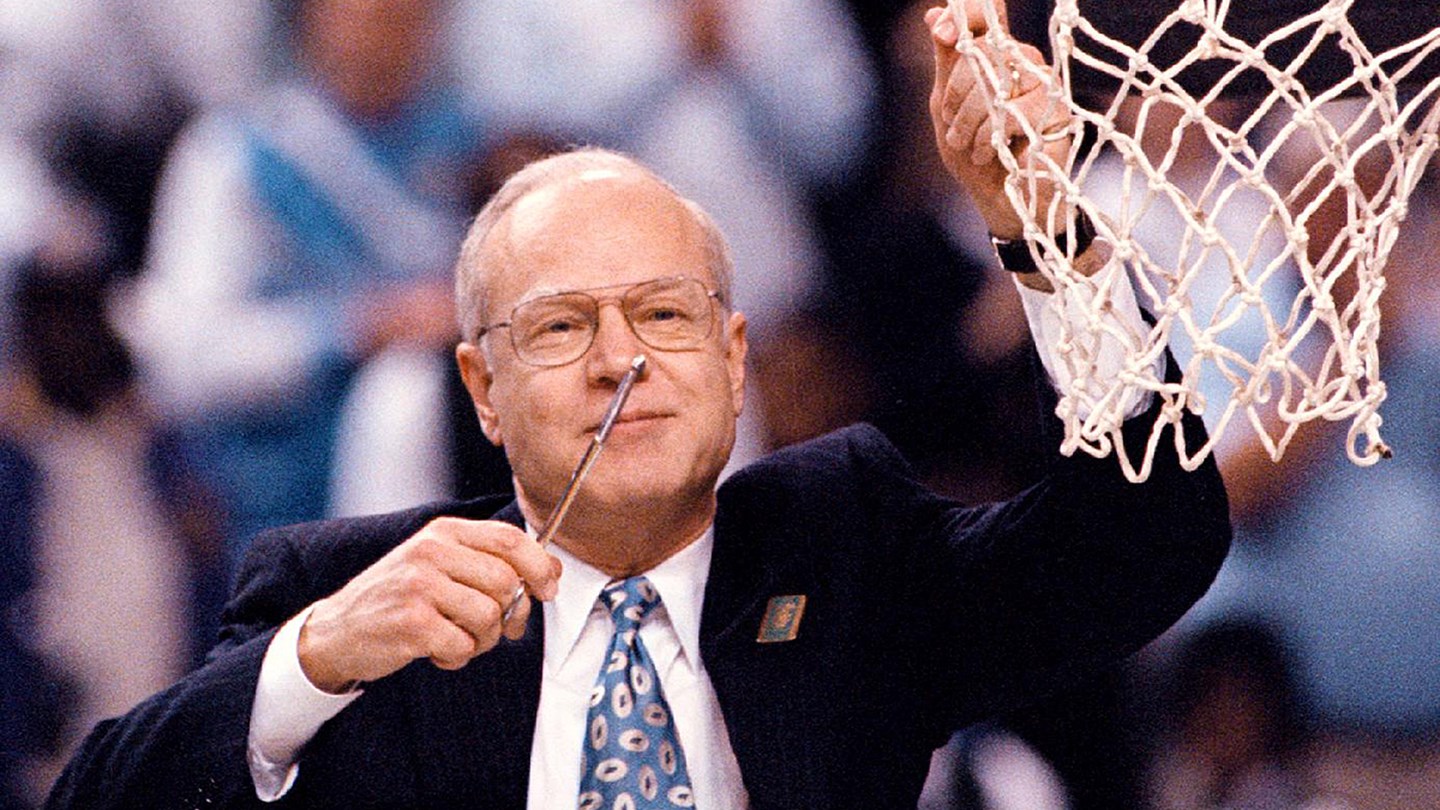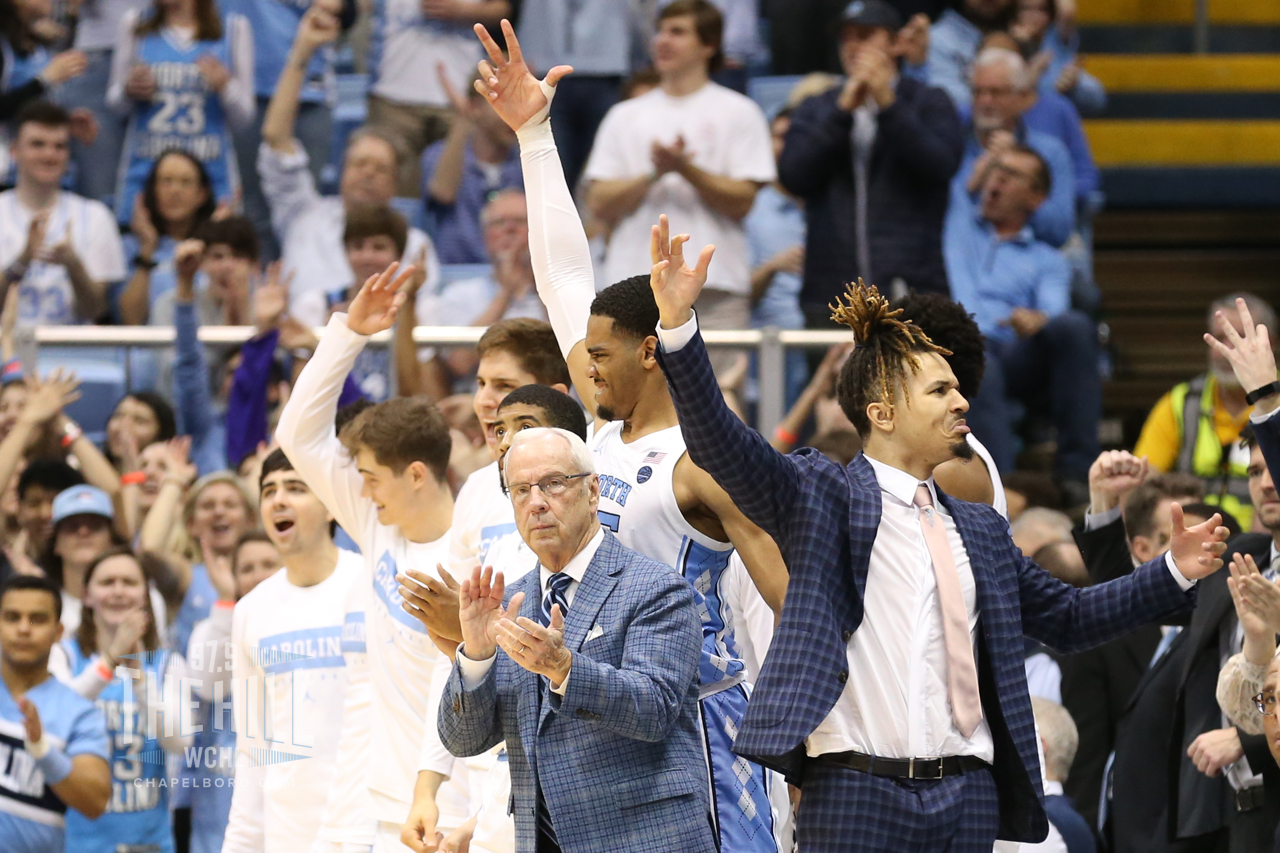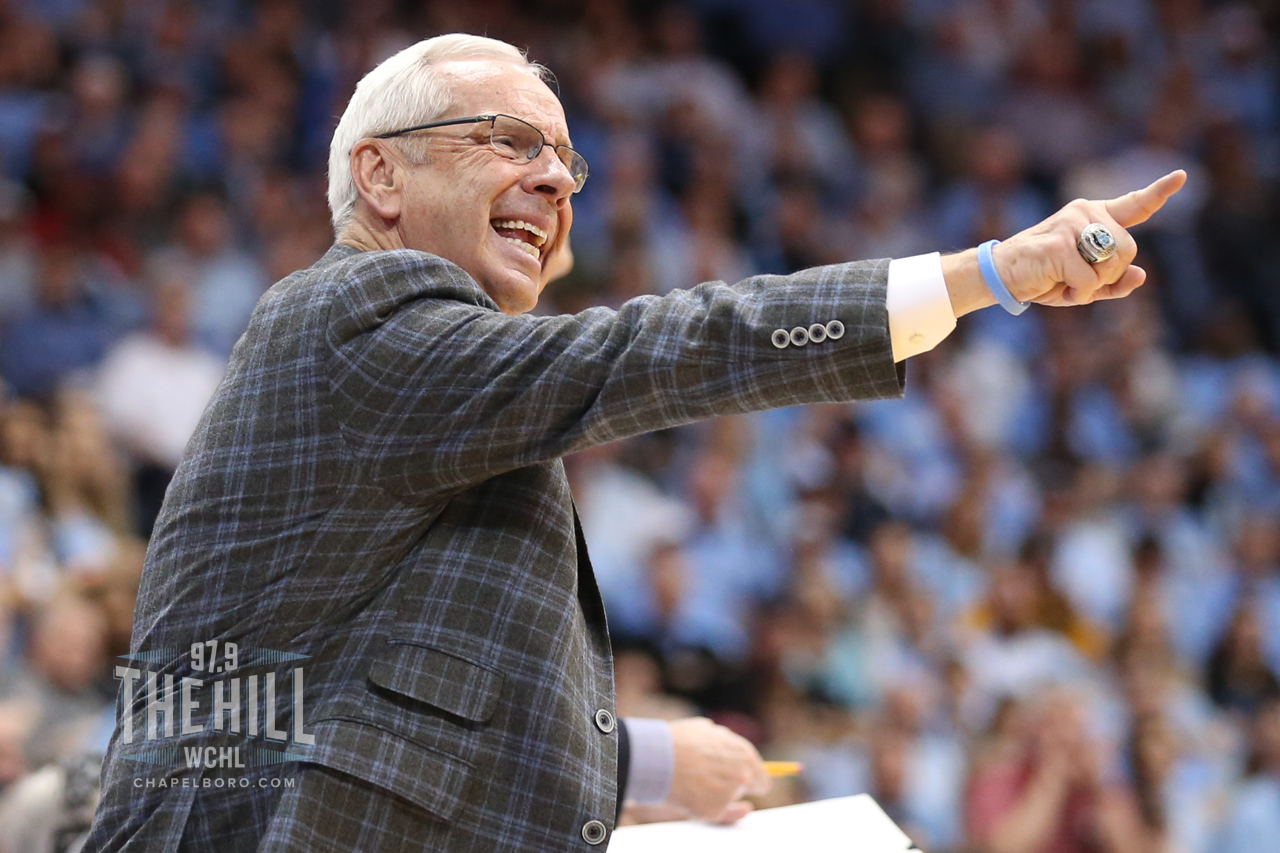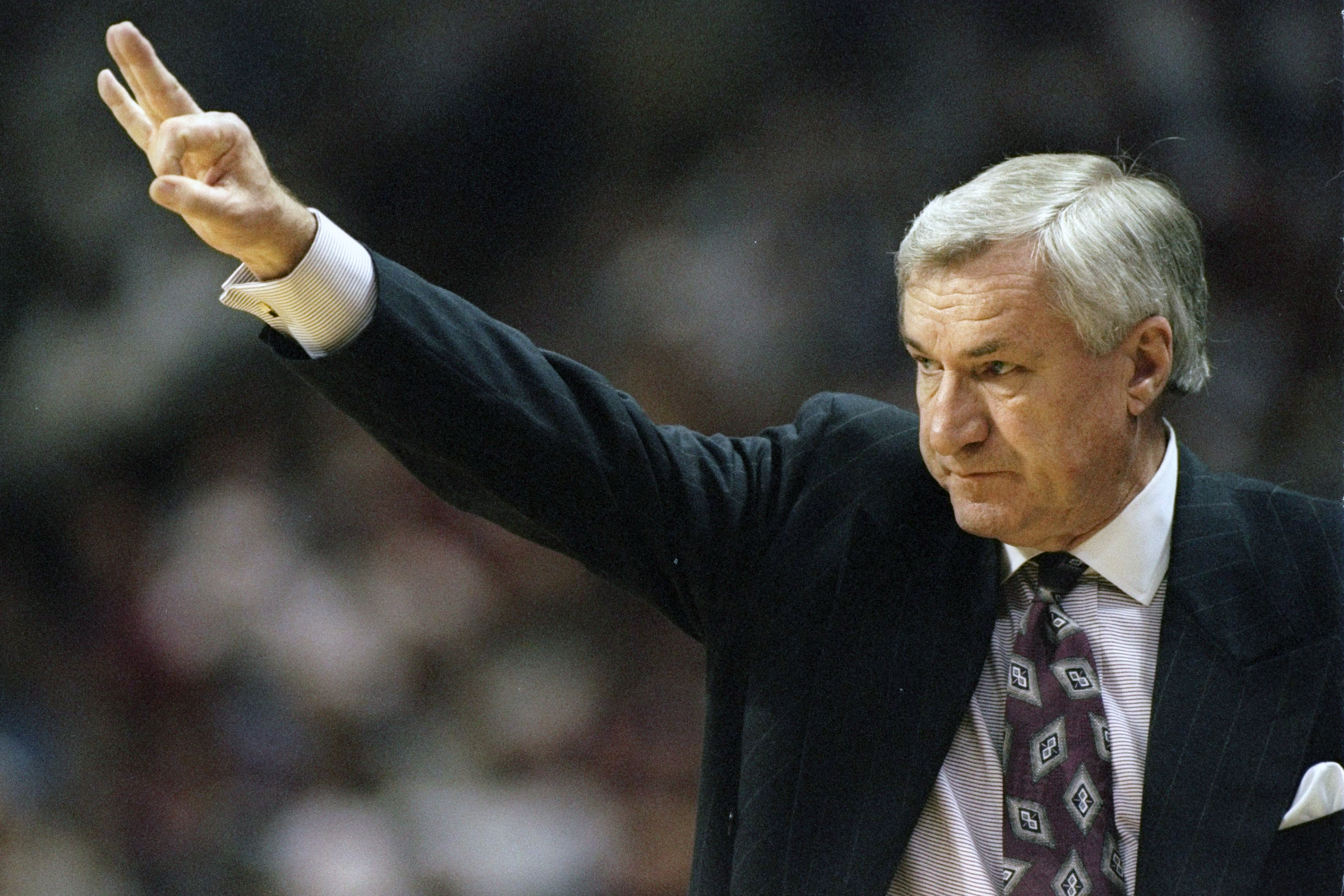As Chapel Hill and the nation mourns the passing of former UNC Coach Dean Smith, tributes from notables are pouring in from far and wide. Read on for sampling of how Coach Smith is being remembered and add your favorite memories in the comments:
President Barack Obama:
Last night, America lost not just a coaching legend but a gentleman and a citizen. When he retired, Dean Smith had won more games than any other college basketball coach in history. He went to 11 Final Fours, won two national titles, and reared a generation of players who went on to even better things elsewhere, including a young man named Michael Jordan—and all of us from Chicago are thankful for that.
But more importantly, Coach Smith showed us something that I’ve seen again and again on the court – that basketball can tell us a lot more about who you are than a jumpshot alone ever could. He graduated more than 96 percent of his players and taught his teams to point to the teammate who passed them the ball after a basket. He pushed forward the Civil Rights movement, recruiting the first black scholarship athlete to North Carolina and helping to integrate a restaurant and a neighborhood in Chapel Hill. And in his final years, Coach Smith showed us how to fight an illness with courage and dignity. For all of that, I couldn’t have been prouder to honor Coach Smith with Medal of Freedom in 2013.
Michelle and I send our thoughts and prayers to his wife Linnea, to his family, and to his fans all across North Carolina and the country.
Congressman David Price (NC-04):
“North Carolina lost one of its most accomplished and admirable citizens yesterday. Dean Smith will long be remembered for his historic successes as coach of the Tar Heels, for the genius and also the integrity he brought to college basketball. He was also a powerful force for good in the community, working actively and courageously for civil rights and equal justice throughout his life.
“I have known Dean since my student days, when he was a beginning coach and an active member of Binkley Baptist Church, a fledgling congregation focused on social justice. I was honored to join his family at the White House in 2013,when he was awarded the Presidential Medal of Freedom. The intervening years mark a remarkable career, a life well-lived, and thousands of lives positively shaped and influenced.”
UNC Chancellor Carol Folt:
“Our Carolina community is deeply saddened by the passing of Dean Smith. Coach Smith was an extraordinary man who cared deeply about people. Known worldwide as a legendary basketball coach, our University, the Chapel Hill community, and the countless students, faculty, staff and people across North Carolina and beyond will remember him as a great teacher and remarkable pioneer in promoting equality and civil rights. For Coach Smith, his players, coaches and staff were family. He was a trusted mentor whose care for his players went beyond the basketball court and continued after they left Carolina. He will be remembered as a great American and true Tar Heel.”
Current UNC coach and Smith disciple Roy Williams:
“It’s such a great loss for North Carolina – our state, the University, of course the Tar Heel basketball program, but really the entire basketball world. We lost one of our greatest ambassadors for college basketball for the way in which a program should be run. We lost a man of the highest integrity who did so many things off the court to help make the world a better place to live in.
He set the standard for loyalty and concern for every one of his players, not just the games won or lost.
He was the greatest there ever was on the court but far, far better off the court with people. His concern for people will be the legacy I will remember most.
He was a mentor to so many people; he was my mentor. He gave me a chance but, more importantly, he shared with me his knowledge, which is the greatest gift you can give someone.
I’m 64 years old and everything I do with our basketball program and the way I deal with the University is driven by my desire to make Coach Smith proud. When I came back to Carolina, the driving force was to make him proud and I still think that today.
I’d like to say on behalf of all our players and coaches, past and present, that Dean Smith was the perfect picture of what a college basketball coach should have been. We love him and we will miss him.”
Duke Basketball Coach Mike Krzyzewski:
“I am incredibly saddened to hear of the passing of Coach Dean Smith. We have lost a man who cannot be replaced. He was one of a kind and the sport of basketball lost one of its true pillars. Dean possessed one of the greatest basketball minds, and was a magnificent teacher and tactician. While building an elite program at North Carolina, he was clearly ahead of his time in dealing with social issues. However, his greatest gift was his unique ability to teach what it takes to become a good man. That was easy for him to do because he was a great man himself. All of his players benefited greatly from his basketball teachings, but even more from his ability to help mold men of integrity, honor and purpose. Those teachings, specifically, will live forever in those he touched. We offer our deepest sympathies – and gratitude for sharing his incredible life with us for so long — to Linnea, his children and the entire North Carolina family.”
UNC Athletic Director Bubba Cunningham:
“Dean Smith was a legendary Hall of Fame coach who will long be remembered as an innovator in the game of basketball and a pioneer for social justice. His legacy will always be a part of the University of North Carolina and will continue to inspire students for generations to come.”
Former UNC Basketball Coach Bill Guthridge:
“Dean was a great friend and a great coach. I will miss him dearly. He was devoted to me and I to him and I will forever be grateful for our friendship.”
Former Athletic Director Dick Baddour:
“Dean was the face of the University of North Carolina for many years. He was a great coach, but an even greater teacher. His legacies are many but what stands out to me is his devotion to his players. While he taught us about the importance of team work, he taught us even more about the importance of relationships.”
Michael Jordan, via Charlotte Hornets:
“Other than my parents, no one had a bigger influence on my life than Coach Smith. He was more than a coach — he was my mentor, my teacher, my second father. Coach was always there for me whenever I needed him and I loved him for it. In teaching me the game of basketball, he taught me about life. My heart goes out to Linnea and their kids. We’ve lost a great man who had an incredible impact on his players, his staff and the entire UNC family.”
ACC Commissioner John Swofford:
“We’ve known for a while this day would come, but it still hits hard.
Sometimes we are blessed to be around certain people in our lives. For me, one of those people was Dean Smith. For 21 years I had the privilege of working with him.
He personified excellence day-in and day-out, year-in and year-out. The remarkable number of wins is well chronicled, but most importantly those wins came while teaching and living the right values. He won, his players graduated and he played by the rules. He was first and foremost a teacher, and his players were always the most important part of his agenda.
His impact on the University of North Carolina, the Atlantic Coast Conference, college basketball and the sport itself, is immeasurable. His leadership off the court in areas such as race relations and education were less chronicled, but just as important.
Sometimes the word legend is used with too little thought. In this instance, it almost seems inadequate. He was basketball royalty, and we have lost one of the greats in Dean Smith.”
Antawn Jamison, UNC Basketball 1995-1998:
“Coach Smith was a coach, mentor and friend. He had a huge impact on my career but had an even bigger impact on my life. I can vouch for all of the things that everyone else has said about him impacting their lives for the best. He was more like a father to me than a coach. In fact, it feels like I’m losing a father. I wouldn’t be the man I am today if it wasn’t for Coach Smith. My heart goes out to his family. It’s definitely a sad day for my family and the Tar Heel nation.”
Deborah Stroman, Kenan Institute, Kenan-Flagler Business School:
Like most people who have a relationship to the basketball world, and certainly the University of North Carolina, I give thanks to the pioneer Coach Dean E. Smith. As a former basketball player at UVA and assistant coach at UNC in the mid-‐1980s, pondering his life and legacy was an easy mental shift on an otherwise task-‐filled weekend day. Working at UNC is a blessing, and I am appreciative every day of this amazing academic institution and its people. The pillars of outstanding teaching, research, and service continue to undergird and foster the creative spirit and activities of campus life. Yet, it was important to stop my routine and celebrate that the UNC brand brightly shines through each and every day across the world primarily because of the impact of Coach Smith on Carolina Basketball as an educator. He helped establish a winning tradition that makes Carolina alumni proud, the Atlantic Coast Conference more competitive, the state of North Carolina pleased, and America honored to share this success worldwide. Coach Smith’s upbringing and sense of morality were critical fibers in the intricate fabric of his basketball program and life principles. Great coaches are amazing teachers. Coach Smith brilliantly taught humanity lessons to everyone on and off the court. I even surmise that perhaps his commitment to player equity became more important than the opportunity to win another title. How many of us questioned his devotion to certainly less-‐talented players by providing them with playing time during key moments in the game? He was giving all of us instruction on kindness, how to instill confidence, demonstrate teamwork, and exhibit sacrifice the Carolina Way. He won those 879 games doing it his way; Coach Smith truly cared about the more important responsibility of developing winners in the game of life. Great coaches also acknowledge their teachers. He wasn’t afraid to seek answers and give tribute to the giants in the game like Coaches John McClendon (inventor of the Four Corners) and John Wooden. He examined and valued the lives of men who had a positive impact on society. Can we ever accurately measure the importance of his stance against racial injustice during a very troubled time in American history? Surely, his progressive activism coupled with a winning tradition influenced many mindsets and public policy. His force as a well-‐informed and courageous leader was powerful outside of the gym. I am ever grateful to have known Coach Smith, and we are all richer for his life instruction.
UNC Athletics:
Former University of North Carolina head men’s basketball coach Dean Smith died Saturday evening in Chapel Hill. He was 83 years old.
“Coach Dean Smith passed away peacefully the evening of February 7 at his home in Chapel Hill, and surrounded by his wife and five children,” the Smith family said in a statement. “We are grateful for all the thoughts and prayers, and appreciate the continued respect for our privacy as arrangements are made available to the public. Thank you.”
Smith was the head coach of the Tar Heels from 1961 to 1997, retiring as the winningest coach in college basketball. He led the Tar Heels to national championships in 1982 and 1993, to 13 ACC Tournament titles, 11 Final Fours, and an NIT championship, and directed the United States Olympic Team to a gold medal at the 1976 Summer Games.
ESPN’s SportsCentury program selected Smith as one of the seven greatest coaches of the 20th Century with Red Auerbach, Bear Bryant, George Halas, Vince Lombardi, John McGraw and John Wooden.In 36 seasons at UNC, Smith’s teams had a record of 879-254. He set the record for winning more games than any Division I men’s coach in history, surpassing Kentucky’s Adolph Rupp with his 877th victory over Colorado in the 1997 NCAA Tournament. He finished his career by leading UNC to the Final Four in four of his final seven seasons.
Under Smith, the Tar Heels won at least 20 games for 27 straight years and 30 of his final 31. No coach in history had ever produced that many consecutive 20-win seasons. Carolina was ranked in the final Top 10 of both the Associated Press and coaches’ polls each year from 1981-89. Smith’s teams finished the season ranked No. 1 in at least one of the two major polls four times (1982, 1984, 1993 and 1994).His teams were the dominant force in the ACC, posting a record of 364-136 in ACC regular-season play, a winning percentage of .728. The Tar Heels finished at least third in the ACC regular-season standings for 33 successive seasons. In that time, Carolina finished first 17 times, second 11 times and third five times. His teams played in 11 Final Fours, second in number only to Wooden, who had 12.
Smith’s teams made 23 consecutive appearances in the NCAA Tournament. In his last 31 years, Smith led the Tar Heels into the NCAA Tournament 27 times. Carolina reached the Sweet 16 of NCAA play each season from 1981-93. That 13-year streak is the second-longest in Tournament history to a 14-year stretch by UCLA from 1967 to 1980. Sports Illustrated selected Smith as the Sportsman of the Year in 1997; he received the Arthur Ashe Award for Courage at the annual ESPY Awards.
In 2013, Smith received the Presidential Medal of Freedom, an award that his wife, Linnea, accepted on his behalf from President Barack Obama at a White House ceremony. Smith was inducted into the Naismith Memorial Basketball Hall of Fame in 1983 and is also a member of the the FIBA Hall of Fame, the North Carolina Sports Hall of Fame, the Kansas Sports Hall of Fame and the College Basketball Hall of Fame. In 2006, he was named to the inaugural class of the National Collegiate Basketball Hall of Fame along with James Naismith, Oscar Robertson, Bill Russell and John Wooden.
Smith also became the first recipient of the Mentor Award for Lifetime Achievement, given by the University of North Carolina Committee on Teaching Awards for “a broader range of teaching beyond the classroom.”
Born February 28, 1931, in Emporia, Kan., Dean Edwards Smith grew up as the son of public school teachers. He graduated from Topeka High School in 1949 and went to the University of Kansas on an academic scholarship. He played varsity basketball and baseball and freshman football for the Jayhawks. He was a member of Jayhawk basketball teams that won the NCAA title in 1952 and finished second in 1953.Smith was an assistant coach at Kansas to Phog Allen and Dick Harp, and served in the U.S. Air Force as a lieutenant.
While in the service, he played and coached basketball in Germany. Smith served for three years as an assistant basketball coach under Bob Spear and one year each as head baseball and head golf coach at the United States Air Force Academy. In 1958, Frank McGuire hired him as an assistant coach at Carolina. Smith served as an assistant under McGuire for three years before McGuire resigned to become head coach of the NBA’s Philadelphia Warriors in the summer of 1961. At that time, Carolina Chancellor William Aycock tapped the 30-year-old Smith to become UNC’s head coach.
Smith shared his knowledge of the game with a talented group of assistants. Many of them went on to head coaching jobs, including Larry Brown, Roy Williams, John Lotz, Kenny Rosemond, Eddie Fogler, Randy Wiel and Bill Guthridge.In Smith’s 36-year tenure, more than 50 of his players went on to play pro basketball in the NBA or ABA and more played in other professional leagues both in the United States and overseas.
Six of Smith’s players won rookie of the year awards in either the NBA or ABA, including Charles Scott, Robert McAdoo, Walter Davis, Phil Ford, Michael Jordan and Vince Carter. McAdoo and Jordan won MVP honors in the NBA and Billy Cunningham was the MVP in the ABA. Three of his players –Cunningham, James Worthy and Jordan – were named to the NBA’s Greatest 50 Players.
Smith coached student-athletes who went on to become doctors, lawyers and businessmen. Better than 95 percent of his lettermen earned their degrees.
Smith retired as the winningest coach in the history of the NCAA Tournament with 65 victories. In 36 ACC Tournaments, he had a coaching record of 58-23, a winning percentage of .716.
Smith, who played for the legendary Phog Allen at Kansas in the early 1950s, is one of only two men to both play on and coach an NCAA championship team. Smith was a member of the Jayhawk squad that won college basketball’s top prize in 1952. Bob Knight is the other person to accomplish the feat.
After taking Carolina to the NCAA championship game in 1977, Smith was named National Coach of the Year by the NABC. He received similar honors from the U.S. Basketball Writers Association and Basketball Weekly in 1979 and from Medalist in 1982. He was named the Naismith National Coach of the Year in 1993 after leading the Tar Heels to the national crown.
In 1993, the Atlantic Coast Sportswriters Association named Smith the ACC Coach of the Year, an honor he received on seven other occasions as well—1967, 1968, 1971, 1976, 1977, 1979 and 1988.

